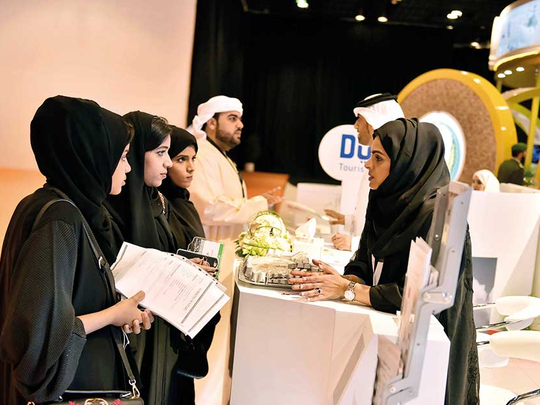
Dubai: The UAE is ranked top in the region in global talent competitiveness ranking. With a global ranking of 19, the country has an index score of 62.49, the highest in the Middle East and North Africa (Mena) region.
INSEAD Business School, Google and the Centre for Economic Growth has released this year’s edition of the Middle East and North Africa Talent Competitiveness Index (MTCI), a study ranking countries in the region based on their ability to attract, grow and retain talent.
Globally, Switzerland is ranked top in the index with Singapore, UK, US and Sweden, in the first five places.
Qatar is ranked second in the region with an index score of 61.09, while Saudi Arabia and Bahrain are ranked fifth and sixth with index scores of 50.36 and 48.7 respectively.
The countries were ranked based on the level of readiness for the future of work: well positioned (UAE, Qatar and Saudi Arabia, Bahrain); mixed readiness (Kuwait and Jordan); less well positioned (Oman, Lebanon and Tunisia) and low readiness (Egypt, Morocco and Algeria).
The Middle East and North Africa Talent Competitiveness Index (MTCI) assesses a group of factors when determining a country’s ranking such as the set of policies and practices, and enabling context, that allow a country to attract, develop and employ the human capital which contributes to its ability to grow, compete and innovate. The MENA report draws from the Global Talent Competitiveness Index (GTCI 2017).
The MTCI provides an in-depth look at Arab countries’ performance and lists a series of recommendations that would help improve their ranking, with investment in education and digital skills at the forefront. Embracing technology, enabling SMEs and providing affordable and high-quality access to the internet were also one of the key recommendations that were found to improve talent competitiveness on a global and regional scale.
“From a demographic point of view, the MENA region is younger than the rest of the world, which is both a blessing and a challenge. On one hand there is energy, creativity and ambition in the new generation; on the other hand creating enough jobs for them is an urgent necessity,” said Dr Bruno Lanvin, Executive Director, Global Indices, INSEAD.
The Mena region has invested considerably in education to improve competitiveness, with an average spend equal to 18 per cent of total government spending versus a global average of 14 per cent. Mena faces a common context: high youth bulge of about two times the global average (30 per cent employment in public sector versus 10 per cent globally), rigid labour market regulations and a gender gap with men three times more likely to participate in workforce than women.
“With the highest youth unemployment rates in the world, our region’s biggest economic challenge is the creation of productive and sustainable jobs for our youth. A key requirement will therefore be developing the talent of the next generation to be competitive for the global economy. This important report enables leaders from the public and private sector to take the targeted actions required in order to achieve this strategic goal,” Patricia McCall, Executive Director, Centre for Economic Growth.
Experts say technology is a critical dimension of this challenge as the jobs of the future need to be thought of in areas such as artificial intelligence, virtual and augmented reality, and lifelong continuous upskilling. Currently the Mena digital economy stands at 4 per cent of GDP (gross domestic product), half of what the US is at 8 per cent and lags behind the EU at 6.
“The Middle East and North Africa has immense potential in its talent and young population. Major factors such as embracing technology, enabling the SME ecosystem to thrive, and providing equal access and connectivity, are key ingredients that would help Arab countries leverage the fourth industrial revolution with the many opportunities that lie within the region,” said Selim Eddé, Head of Public Policy at Google Mena.












